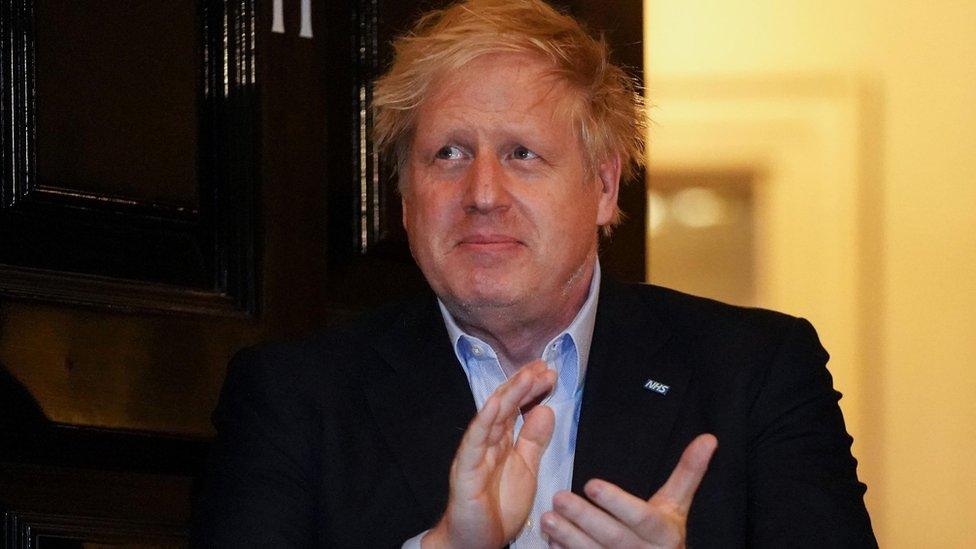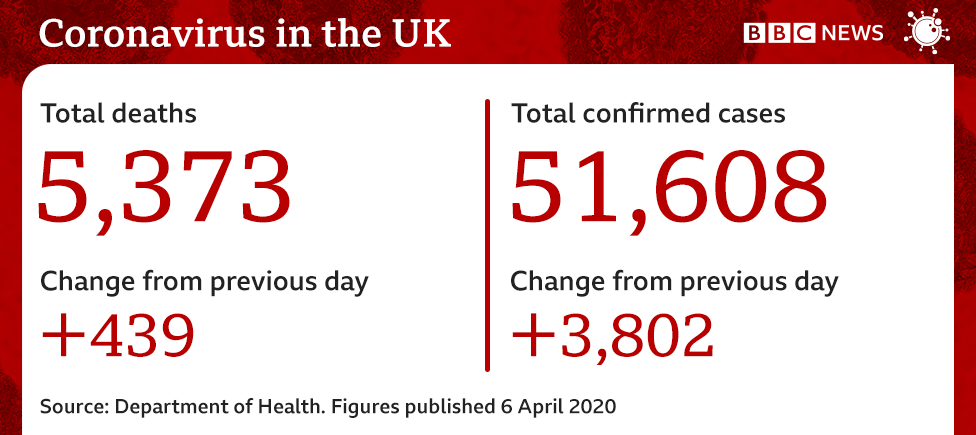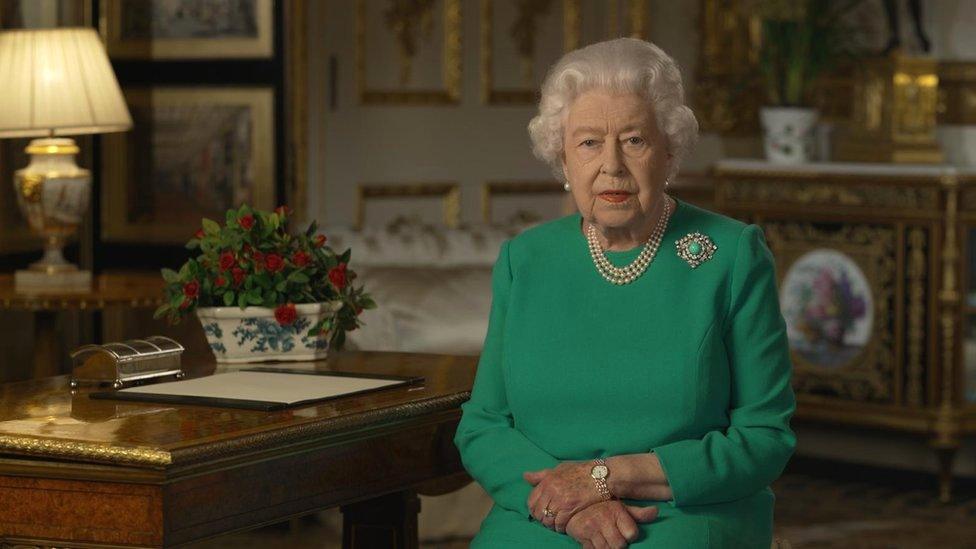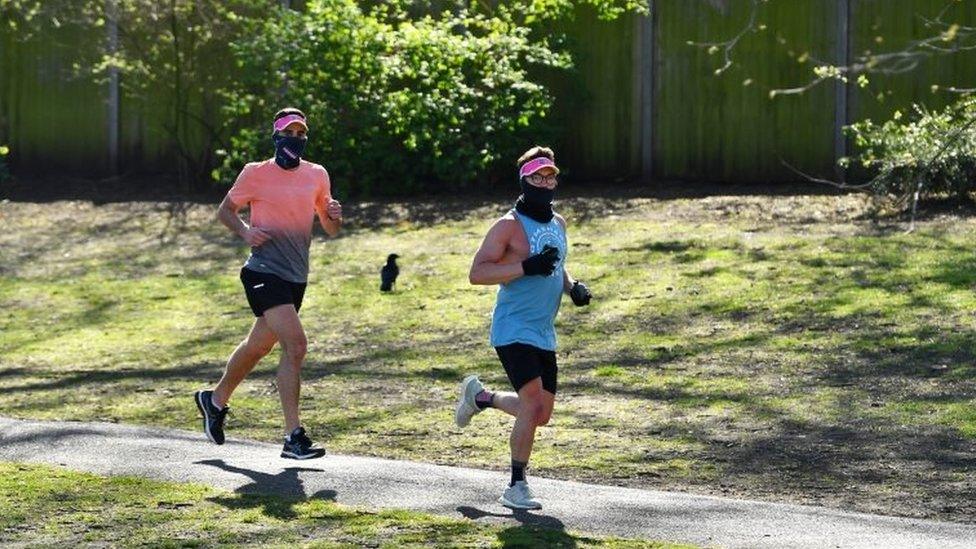Coronavirus: Boris Johnson in 'good spirits' in hospital
- Published

The PM took part in the clap for carers on Thursday outside No 11 Downing Street
Boris Johnson says he is in "good spirits" after spending the night in hospital with coronavirus.
The PM was taken to St Thomas' Hospital in London on Sunday evening with "persistent symptoms" - including a temperature and a cough - for routine tests.
It comes as the number of coronavirus hospital deaths in the UK reached 5,373 - an increase of 439 in a day.
The Department of Health and Social Care reported 51,608 confirmed cases.
The prime minister, 55, tested positive for coronavirus 10 days ago.
He remains in charge of government, although Foreign Secretary Dominic Raab chaired Monday's coronavirus meeting.
In a tweet, external, Mr Johnson said he was "keeping in touch with my team as we work together to fight this virus and keep everyone safe".
He also thanked the "brilliant NHS staff" taking care of him and other patients, adding: "You are the best of Britain".
The prime minister's official spokesman said he remained in hospital "under observation", and described Russian reports that Mr Johnson had been placed on a ventilator as "disinformation".
He is continuing to receive updates and briefings in hospital, the spokesman added.
Last month, the prime minister's spokesman said if Mr Johnson was unwell and unable to work, Mr Raab, as the first secretary of state, would stand in.
Allow X content?
This article contains content provided by X. We ask for your permission before anything is loaded, as they may be using cookies and other technologies. You may want to read X’s cookie policy, external and privacy policy, external before accepting. To view this content choose ‘accept and continue’.
Earlier, Housing Secretary Robert Jenrick said he hoped the prime minister would be back in Downing Street "as soon as possible".
"He's been working extremely hard leading the government and being constantly updated. That's going to continue," he told BBC Breakfast.
"I'm sure this is very frustrating for him, for somebody like Boris who wants to be hands [on] running the government from the front, but nonetheless he's still very much in charge of the government," he added.
Jenrick: PM 'still very much in charge'

A SIMPLE GUIDE: How do I protect myself?
AVOIDING CONTACT: The rules on self-isolation and exercise
LOOK-UP TOOL: Check cases in your area
MAPS AND CHARTS: Visual guide to the outbreak

US President Donald Trump is among those who has sent his wishes to Mr Johnson.
"All Americans are praying for him. He's a great friend of mine, a great gentleman and a great leader," Mr Trump said, adding that he was sure the prime minister would be fine because he is "a strong person".
And Labour leader Sir Keir Starmer said he hoped the prime minister had a "speedy recovery".
Health minister Nadine Dorries, who herself tested positive for coronavirus last month, said many of those with the virus would be "felled" by fatigue and a high temperature and use isolation to sleep and recover.
"Boris has risked his health and worked every day on our behalf to lead the battle against this vile virus," she said in a tweet, external.
Meanwhile, the former head of the civil service Lord Kerslake said it may be "sensible" for Mr Johnson to "step back" if he is not well enough to carry out his role for now.
"I think in the end if he's not well, he will have to reflect on this because the job's tough at the best of times and it's doubly tough now," he told the BBC Radio 4's Today programme.


Although Downing Street insist the PM is still in charge, if the medics insist he needs to rest and recuperate then he may well have to take a step back for a period of time.
In the UK we no longer have a deputy prime minister - the last one was Nick Clegg under David Cameron.
Technically, Dominic Raab - as first secretary of state - would be expected to step up.
His position as foreign secretary, however, does not put him at the centre of the fight against coronavirus.
It would seem likely therefore that the two figures who would be expected to take a key role would be Cabinet Office Minister Michael Gove and Health Secretary Matt Hancock.
Both men have been frequent representatives of the government at the daily news conferences.
Fortunately, however, many of the key decisions - namely how long the lockdown should continue and what the exit strategy should be - still appear some way off.
At the moment the focus is on "flattening the curve" and reducing the level of infections and admissions to hospital.
The day-to-day decisions are therefore likely to depend much more on the advice of the scientists and officials.
The really big decisions are some way off - when it is hoped the prime minister will have recovered.

Dr Sarah Jarvis, a GP and broadcaster, told the BBC that Mr Johnson would be likely to have his chest X-rayed and his lungs scanned, particularly if he had been struggling for breath.
She said he is also likely to have an electrocardiogram to check his heart's function, as well as tests on his oxygen levels, white blood cell count, and liver and kidney function before he is released from hospital.
Mr Johnson has worked from home since it was announced that he had tested positive for coronavirus on 27 March.
He was last seen in public applauding the NHS and other key workers from his flat in Downing Street on Thursday evening, and chaired a coronavirus meeting remotely on Friday morning.
Later that day, the prime minister posted a Twitter video in which said he was still displaying minor symptoms.
Boris Johnson posted a video message on Friday
"I still have a temperature. So in accordance with government advice I must continue my self isolation until that symptom itself goes," he said.
"But we're working clearly the whole time on our programme to beat the virus."
On Saturday, his pregnant partner Carrie Symonds tweeted that she had spent a week in bed with the main symptoms.
She said she had not been tested for the virus.
Health Secretary Matt Hancock had also tested positive for the virus and returned from self-isolation on Thursday to host the daily Downing Street news conference.
The government's chief medical adviser, Prof Chris Whitty, self-isolated after showing symptoms but has now recovered and is back at work.
Tony Lloyd, Labour MP for Rochdale, has also been admitted to hospital for coronavirus treatment.
Sir Keir wished him a "swift and full recovery" on Twitter on Monday afternoon.
The news of Mr Johnson's admission to hospital came shortly after the Queen delivered a rallying message to the nation, saying the UK "will succeed" in its fight against the coronavirus pandemic.
In a rare speech, the monarch thanked people for following government rules to stay at home and praised those "coming together to help others".

In other developments:
London's emergency services are setting up specialist teams to handle Covid-19 deaths that do not happen in hospital
No 10 said 27,000 former healthcare professionals have registered to return to the NHS
Around 13% of police officers and support staff are currently off work, the president of the Police Superintendents' Association of England and Wales has said
Scotland's chief medical officer has resigned after making two trips to her second home - despite government guidance urging people to avoid unnecessary travel
The National Domestic Abuse helpline has seen a 25% increase in calls and online requests for help since the lockdown, the charity Refuge says
High street pharmacists are "needlessly being put at risk" due to a lack of personal protective equipment (PPE), the Royal Pharmaceutical Society says
Train drivers' union Aslef is also calling for London Underground drivers to be provided with masks and gloves to protect them from contracting Covid-19
Young workers and the worst paid are the most likely to be affected by the closure of businesses because of coronavirus, according to research by the Institute for Fiscal Studies
The Open Championship has been cancelled for the first time since World War Two. It had been due to take place in July

How have you been affected by the issues relating to coronavirus? Share your experiences by emailing haveyoursay@bbc.co.uk, external.
Please include a contact number if you are willing to speak to a BBC journalist. You can also contact us in the following ways:
WhatsApp: +44 7756 165803
Tweet: @BBC_HaveYourSay, external
Send pictures/video to yourpics@bbc.co.uk, external
Please read our terms & conditions and privacy policy
- Published5 April 2020

- Published5 April 2020
